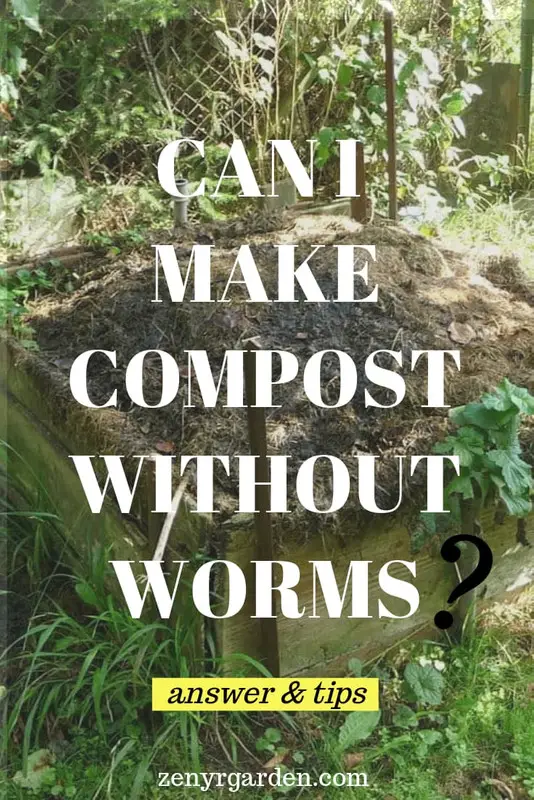You can absolutely make good compost without worms. Worms, like some other organisms, are one type of decomposers in the natural system. Even though they are great decomposers, some folks can be grossed out by their little wiggly movement.
But the good news is, there are many other beneficial decomposers in the eco-system like good bacteria, useful enzymes that can help with the breaking down process.
The best thing of all is that you won't see them wiggling around like worms do (if you're scared of this movement). Many of these microbes are invisible to the naked eyes. Besides, some types of worms are not really great for composting.
If you want to make compost without worms, here are also some ideas to get started:
Method #1: Thermal Composting
For thermal composting (aka aerobic composting), we are using the heat generated by the microbial activity to help with the decomposing.
The pile can get up to 150F (65C) when the little organisms are most active. You don't need worms to do the work because in this case an army of little microbes will get it done for you.
For this, you'll want a lot of air and oxygen. With an abundant supply of oxygen, the bad microbes will be pushed further away & the good microbes will have room to grow. Basically, we'd want 3 things for thermal composting:
- Food
- Air
- Moisture
In a bin, you can mix in around 3 parts brown & 1 part green or layer them one by one on top of the other. The key thing is not to press your pile down too much or too compact.
Because the compaction may push out & leave little room for air exchange in and out of the bin. You can turn the compost once a week or every other week to help with the oxygen & heat generation.
Decomposing with good air & heat can take around 3 months. With less oxygen & heat, it may take around 6-12 months especially when the weather is cooler. The lower temperature may cause the microbes to be less active & go into hibernation mode.
Once the compost is done, you'll see some black, crumbly soil that smells nice & earthy. The initial food scraps will be broken down & will no be longer visible. This is good compost to use to start your garden beds or grow some chemical-free yummy veggies.
What to put in the compost:
| Good | No-no |
|---|---|
| veggie peelings | tins |
| uncoated junk mails | glass |
| uncoated cardboard | plastic |
| egg carton | meat scraps |
| brown leaves | cooked foods |
| hamster bedding | cat litter |
Here are some browns & greens ideas:
| Greens | Browns |
|---|---|
| young tender leaves | dry leaves |
| banana peels | straw |
| kale | cardboard |
| apple | wood shavings |
| carrot | sawdust |
| tomato | carbon-rich stuff |
Let's check out another way we can make compost:
Method #2: Cold Composting
In cold composting (aka anaerobic composting), we'd want to do the opposite of thermal composting. With this composting style, we want to trap the oxygen out & let the food scraps ferment inside the bin.
The advantage of this method is that it helps keep most of the nutritional value of the original stuff. Because there is little to no heat generated during this process. It won't transform the good bits but just chop them down smaller. This method is also more commonly known as bokashi composting.
The best thing of all is that we don't have to worry about the smell. The microbes will ingest it all. Even if we let some air get in, these little creatures will still survive because they are aerotolerant. They can protect themselves in the presence of reactive oxygen molecules.
To make compost using this method, we'll need:
- Food
- Bokashi bran
The bokashi bran are the spent beer or rice grains that they've inoculated the good anaerobic microbes strains. These are the guys that will help with the fermentation process. They are usually the lactic acid bacteria, yeast and some photosynthetic ones.
The first step you can often begin with is:
Step 1: Sprinkle Bokashi Bran in the Bin
To make this compost, sprinkle some bokashi bran at the bottom of the bin. Then put in your kitchen scraps. For every 3-4 inches (8-10 cm) of scraps, sprinkle in some more bokashi bran. It's better to put in more bokashi bran that what it seems needed. We don't want the scraps to give off a putrid smell.
Step 2: Put the Food Waste in & Wait to See the Magic
While putting the food waste in, make sure you press the layers down as tightly as possible. This is to push the oxygen out so the anaerobic microbes can do their work.
Finally, seal the bucket with an air-tight lid. Then, put the bucket somewhere with shade. After about 2-4 weeks, you'll have some good compost that you can use for the garden.
To use the done bokashi compost in the garden, you can try:
Using the Bokashi in the Garden
You can use some of the done bokashi compost as mulch, or bury some into a trench or garden bed as fertilizer or for further decomposing.
If there's liquid in the bucket, pour it out. You can dilute that liquid to use as a compost tea. It strengthens plants, prevents diseases & builds the fertility of the soil.
The concentrated liquid can be used to flush down toilet to fix any clogging issues. The liquid will help decompose any materials that may be clogging up in the pipes.
What to Put in the Bokashi Cold Compost
You can basically put in any organic materials in this compost that we normally don't put in the hot compost method.
- Bones
- Egg shells
- Meat scraps
- Cheese
- Cooked foods
- Citrus/onions
- All other organic stuff
If you put watermelon rinds in, it's good to dry them a bit because the rinds are a bit watery–similar with other fresh fruits or veggies. We don't want the solids to be sitting in liquid or too much moisture because it may cause an unpleasant odor.
Bye-bye Worms & Let's Make Your Compost
As you can see, there are other good ways to compost without worms. There is nothing wrong with worms. They are great decomposing creatures. It's just that they may scare off some new folks to composting & we're showing that there are indeed other ways to make good compost.
Now that we have some ideas for hot & cold composting, let's get our bins started and make your compost. You won't be disappointed & you will get super good veggies in your garden beds or plants.
It's a truly fun & rewarding process. For more composting tips, check out our composting series. Have fun & see y'all here again next time.
Share or pin this post!


